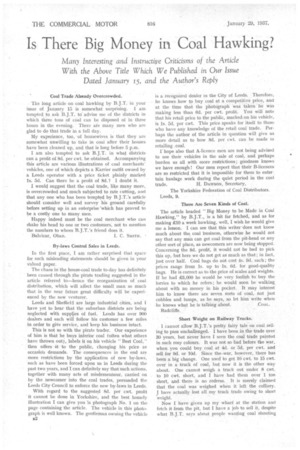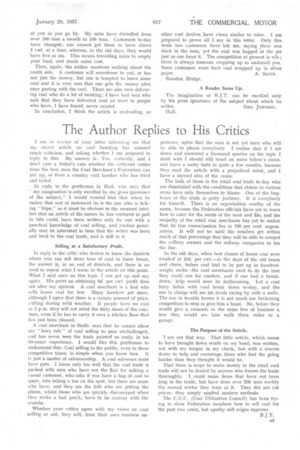Is There Big Money in Coal Hawking?
Page 36

Page 37

If you've noticed an error in this article please click here to report it so we can fix it.
Many Interesting and Instructive Criticisms of the Article With the Above Title Which We Published in Our Issue Dated January 15, and the Author's Reply
Coal Trade Alseady Overcrowded.
The long article on coal hawking by B.J.T. in your issue of January 15 is somewhat surprising. I am tempted to ask B.J.T. to advise me of the districts in which three tons of coal can be disposed of in three hours in the evening. There are many men who are glad to do that trade in a full day.
My experience, too, of housewives is that they are somewhat unwilling to take in coal after their houses have been cleaned up, and that is long before 5 p.m.
I am also tempted to ask B.J.T. in what districts can a profit of 8d. per cwt. be obtained. Accompanying this article are various illustrations of coal merchants' vehicles, one of which depicts a Karrier outfit owned by a Leeds operator with a price ticket plainly marked 1s. 5d. Can there be a profit of 8d.? I doubt it.
I would suggest that the coal trade, like many more, is overcrowded and much subjected to rate cutting, and that any one who has been tempted by B. J.T.'s article should consider well and survey his ground carefully before setting up in an enterprise 'which has proved to be a costly one to many men.
Happy indeed must be the coal merchant who can shake his head to one or two customers, not to mention the numbers to whom 13. J.T.'s friend does it.
Balvicar, Oban. I. C. SMITH. '
By-laws Control Sales in Leeds.
In the first place. I am rather surprised that space for such misleading statements should be given in your valued paper.
The chaos in the house-coal trade to-day has definitely been caused through the pirate trading suggested in the article referred to—hence the reorganization of *coal distribution, which will affect the small man so much that in the near future great difficulty will be experienced by the new venturer.
Leeds and Sheffield are large industrial cities, and I have yet to hear that the suburban districts are being neglected with suppkies of fuel.. Leeds has over 900 dealers and each will follow his customer a few miles in order to giVe service, and keep his business intact.
This is not so with the pirate trader. Our experience of him is that he buys inferior coal (often what others have thrown out), labels it on his vehicle "Best Coal,then offers it to the public, changing his price as occasio'n demands. The consequences in the end are more restrictions by the application of new by-laws, such as have been forced upon us in Leeds during the past two years, and I can definitely say that such actions, together with many acts of misdemeanour, carried on by the newcomer into the coal trades, persuaded the Leeds City Council to enforce the new by-laws in Leeds.
With regard to the suggested 8d. per cwt. profit • it cannot be done in Yorkshire, and the best homely illustration I can give you 'is photograph No. I. on the page containing the article. The vehicle in this photograph is well known. The gentleman owning the vehicle a2 is a recognized dealer in the City of Leeds. Therefore, he knows how to buy coal at a competitive price, and at the time that the photograph was taken he was making less than 6d. per cwt. profit. You will note that his retail price to the public, marked on his vehicle, is 1s, 5d, per cwt. This price speaks for itself to those who have any knowledge of the retail coal trade. Perhaps the author of the article in question will give us more detail as to how 8d. per cwt. can be made in retailing coal.
I' hope also that A-licence men are not being advised to use their vehicles in the sale of coal, and perhaps burden us all with morerestrictions; goodness knows we have enough l Our men report that their B-licences are so restricted that it is impossible for them to entertain haulage work during the quiet period in the coal trade. H. DAIVSON, Secretary,
The Yorkshire Federation of Coal Distributors. Leeds, 9.
There Are Seven Kinds of Coal.
The article headed "Big Money to be Made in Coal Hawking," by B.J.T., is a bit far fetched, and as for making £10 a week hawking, well, I wish he would give me a lesson. I can see that this writer does not know much about the coal business, otherwise he would not say that any man can get coal from the pit-head or any other sort of place, as newcomers are now being stopped. Concerning the 8d. profit, it would not be bad to pick this up, -but here we do not get as much as that ; in fact, just over half. Coal bags do not cost 4s. Rd. each ; the prices range from is. up to is. 6d. for good-quality bags. He is correct as to the price of scales and weights. If he had 43,000 he would be very foolish to buy the lorries to which he refers ; he would soon be walking about with no money in his pocket. It may interest him to know there are seven sorts of coal, not just cobbles and lumps, as he says, so let him write when he knows what he is talking about. Cow.. Radcliffe.
Short Weight on Railway Trucks.
I cannot allow B.J.T. 's pretty fairy tale on coal selling to pass unchallenged. I have been in the trade over 30 years, but never have I seen the coal trade painted in such rosy colours. It was not so bad before the war, when you could buy coal at 4d. or 5d. per cwt. and sell for 9d. or 10d. Since the-war, however, there has been a big change. One used to get 10 cwt. to 15 cwt. over in a truck of coal, but now it is the other way about. One cannot weigh a truck out under 8 cwt. to 10 cwt. short, and I have had them over 1 ton short, and there is no redress. It is merely claimed that the coal was weighed when it left the colliery. I have actually lost all my truck trade owing to short weight.
Now I have given up my wharf at the station and fetch it from the pit, but I have a job to sell it, despite what B.J.T. says about people wanting coal *shouting at you as you go by. My sales have dwindled from over 500 tons a month to 100 tons. Customers to-day have changed; one cannot get them to have above 1 cwt. at a time, whereas, in the old days, they would have five or six. This means travelling miles to empty your load, and much extra cost.
Then, again, the author mentions nothing about the credit side. A .customer will sometimes be out, or has not 'just the money, but one is tempted to leave some coal and it is very rare that one gets the money after once parting with the coal. There are also men delivering coal who do a lot of twisting; I have had men who said that they have delivered coal on trust to people who have, I have found, never existed.
In conclusion, I think the article is misleading, as other coal dealers have views similar to mine. I am prepared to prove all I say in this letter. Only this week two customers have left me, saying ;there was slack in the nuts, yet the coal was bagged at the pit just as one buys it. The competition at present is vile ; there is always someone cropping up to undersell you. Some customers want their coal wrapped up in silver paper, A. SMITH. Standon Bridge.
A Reader Sums Up.
The imagination of B.J.T. can be excelled only by his gross ignorance of the subject about which he
writes. GEO. JOHNSON. Hull.




















































































